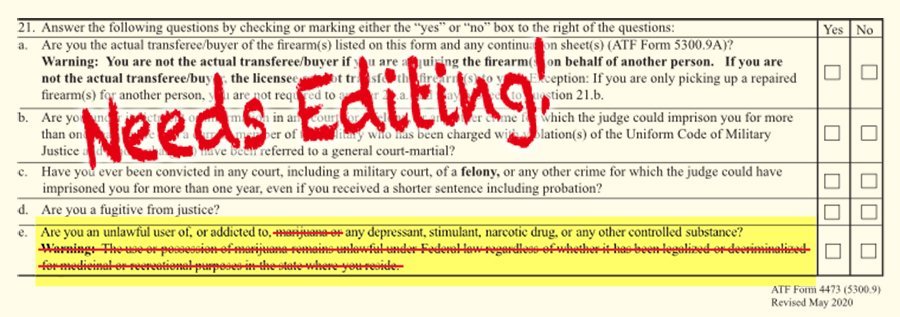FORM 4473, QUESTION 21(E): UP IN SMOKE?
By TSRA AdminPresident Biden's move to pardon thousands of people convicted of federal charges of marijuana possession may have an interesting, and completely unintended, consequence: the elimination of the marijuana prohibition on firearm ownership.
Anyone that has ever completed the Form 4473 Firearms Transaction Record is familiar with Question 21(e): "Are you an unlawful user of, or addicted to marijuana or any depressant, stimulant, narcotic drug, or any other controlled substance?"
Question 21(e) is a clever "Catch-22." If you answer "Yes," you are prohibited from purchasing or even temporarily possessing a firearm. On the other hand, if you are a user and answer "No," you are committing a federal offense. Of course, if you answer "No," the federal government has to prove you were a user of marijuana at the time you completed the Form 4473, which, without a conviction, is going to be difficult.

This prohibition was added by the Gun Control Act of 1968, which was passed in the days when even possession of a small amount of marijuana was a felony under state and federal laws, often carrying draconian penalties.
Fast forward 54 years and simple possession of a small amount of marijuana is a misdemeanor at most and medical use has been decriminalized in the majority of states. Even the federal government has reduced simple possession to a misdemeanor.
The Fifth Amendment to the U.S. Constitution says: "No person shall be held to answer for a capital, or otherwise infamous crime, unless on a presentment or indictment of a Grand Jury, except in cases arising in the land or naval forces, or in the Militia, when in actual service in time of War or public danger; nor shall any person be subject for the same offence to be twice put in jeopardy of life or limb; nor shall be compelled in any criminal case to be a witness against himself, nor be deprived of life, liberty, or property, without due process of law; nor shall private property be taken for public use, without just compensation."
The right to keep and bear arms is one of an American citizen’s civil liberties, protected by both the Second and Fourteenth Amendments. This was affirmed by the U.S. Supreme Court in McDonald v. City of Chicago in 2010. So it would appear that the marijuana question, which doesn’t require a conviction, should have been eliminated some years back. But that’s where the "Catch-22" comes in: you are making what amounts to a confession, waiving your Fifth Amendment protections, or committing perjury if you actually do use marijuana, even in states where it is legal. This kind of thing is why attorneys are held in such high regard by most people.
With the President’s actions, however, it is going to be challenging to retain the question. Those who receive pardons will have all of their civil rights, including the right to keep, bear, and purchase firearms, restored.
In addition, the reduction in federal simple possession laws is clear evidence that it no longer counts as a "capital or otherwise infamous crime," which is usually considered to mean a felony. The only misdemeanor that would remain as a prohibition is a conviction for domestic violence and possession of marijuana is not a crime of violence. Remember, we are only talking about possession of small amounts of marijuana, not crack, heroin or whatever other drugs are federally classed as felonies
There are now enough ins and outs involved for a serious legal challenge to Question 21(e). In reality, the administration’s actions and even the way the question is worded in the present tense could create headaches for legislators and jurists, no matter which side of the legalization issue they are on.
Given the President’s stance on Second Amendment rights, removing a prohibition on possessing firearms is going to create a conundrum that will be fun to watch but the smartest thing to do might be to simply edit Question 21(e) to omit marijuana and ask about any felony drug convictions instead of requiring self-incrimination.
[Note: Neither the Texas State Rifle Association (TSRA) nor the Texas State Rifle Association Political Action Committee (TSRA-PAC) take a position on the use and/or legal status of marijuana.]
